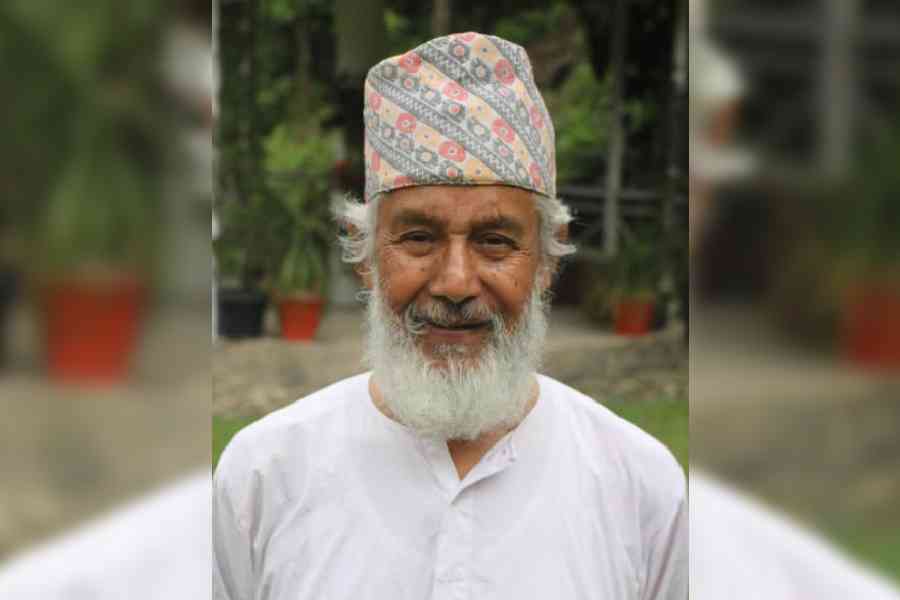Ram Chandra Poudyal, 80, a prominent pro-democracy leader and a former minister of Sikkim, has gone missing since July 7.
Family sources said the leader, who is popularly known as R.C. Poudyal, had left his residence at Chota Singtam in Pakyong district around 9am on July 7 to meet his relatives and promised to return by afternoon.
“R.C. Poudyal was wearing a light blue kurta with white pyjama and a Nepali topi and was carrying a red umbrella and a black walking stick when he left home,” said a source.
Sikkim police have constituted a special investigation team (SIT) to trace the missing person and announced a cash reward for any lead in the case.
“A team from Pakyong police station has also left for Siliguri,” said a source. Poudyal’s mobile phone was last switched on at Rangpo, a town along the Sikkim-Bengal border.
Poudyal had actively participated in the 1973 “democracy movement” of Sikkim and gone on a seven-day fast in Gangtok.
“His fast helped mobilise people for the movement,” said Somnath Poudyal, Poudyal’s brother and a former Sikkim minister.
The agitators were demanding a written constitution, fundamental rights, universal adult franchise and abolition of a reservation formula prevalent in Sikkim then. Sikkim was then under the rule of Chogyal Palden Thondup Namgyal, who had been crowned in 1965.
With Chogyal unwilling to succumb to the demands, thousands took to the streets for three days from April 3 to 5, 1973. Six people were killed and hundreds were injured in the three-day agitation.
Representatives of some political parties in Sikkim approached the then Indian Prime Minister, Indira Gandhi, for intervention to restore law and order in Sikkim which was officially a protectorate state of India.
Chogyal was also persuaded to appeal to India to take over the administration of Sikkim until a solution was worked out.
Subsequently, Sikkim political parties, Chogyal and the Indian government signed an agreement, which, many say, drastically reduced the king’s powers.
It was also agreed that the number of seats in the Sikkim Assembly would increase
from 17 to 32. While the Bhutia/Lepcha and Nepali communities had 15 seats each reserved in the House, the Sangha and the Scheduled Castes were represented by one member each.
In the 1974 elections, the Sikkim Congress won 31 of the 32 seats with R.C. Poudyal winning from the Loosing-Pachekhani seat.
“He had been the deputy Speaker of the Assembly from 1975 to 1977 and later became a cabinet minister of forest and land and land reforms department,” said Somnath.
Following the 1974 elections, the Sikkim Assembly held a referendum, which resulted in New Delhi conferring the status of India’s full-fledged state on Sikkim. India’s Lok Sabha passed the 36th Amendment Bill, 1975, which the President signed into law on May 16, 1975.
“My elder brother fought for democracy despite being close to Chogyal, who even used to visit our house. However, when the seat reservation for the Nepali community was done away with, he stood up against the decision,” said Somnath.
R.C Poudyal was also the founder of the Rising Sun party.
He had filed a case in the Supreme Court against the Sangha seat in the Sikkim Assembly. The Sangha seat does not have a physical constituency but monks of the registered Buddhist monasteries elect the MLA. Poudyal lost the case.











